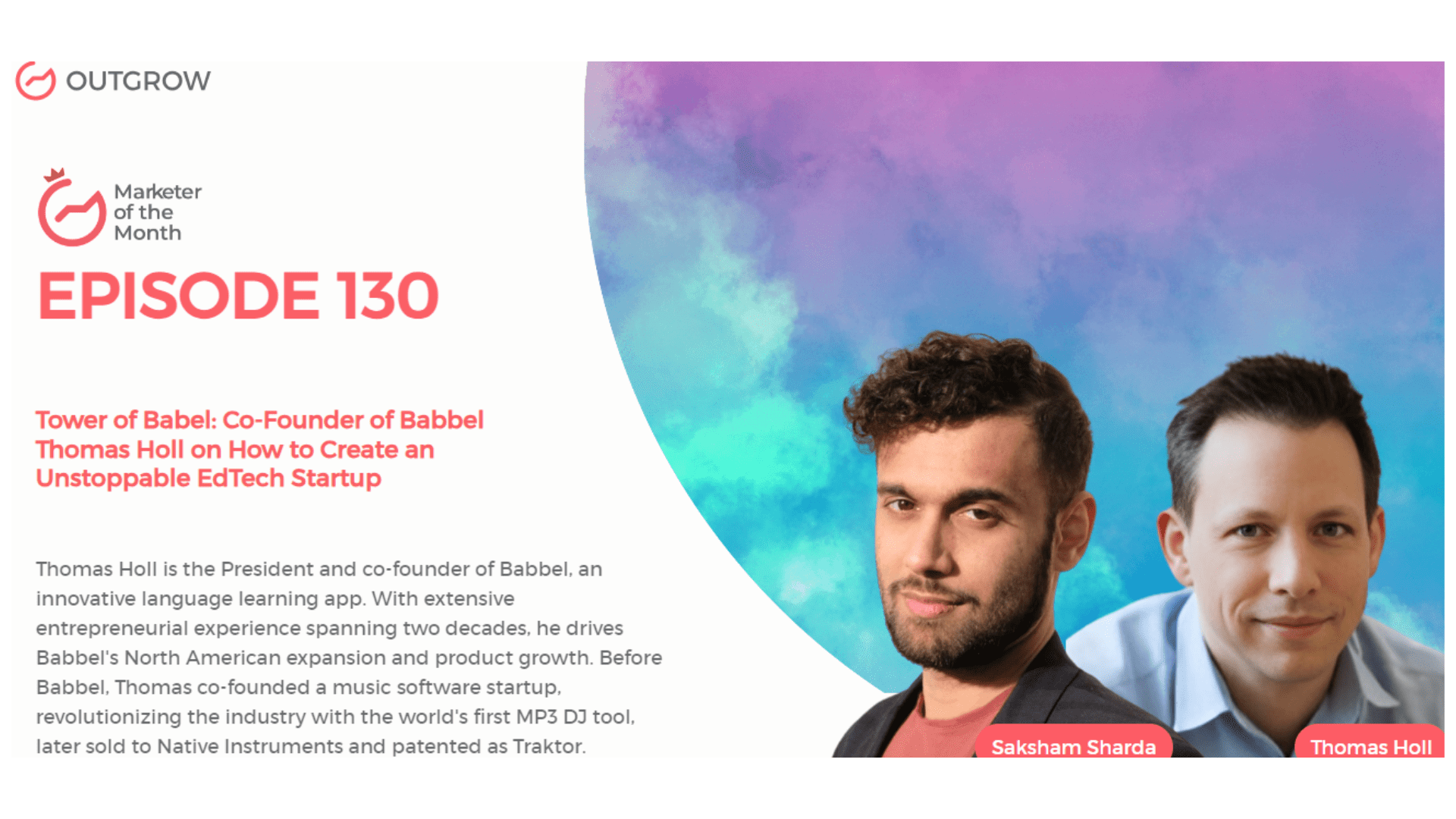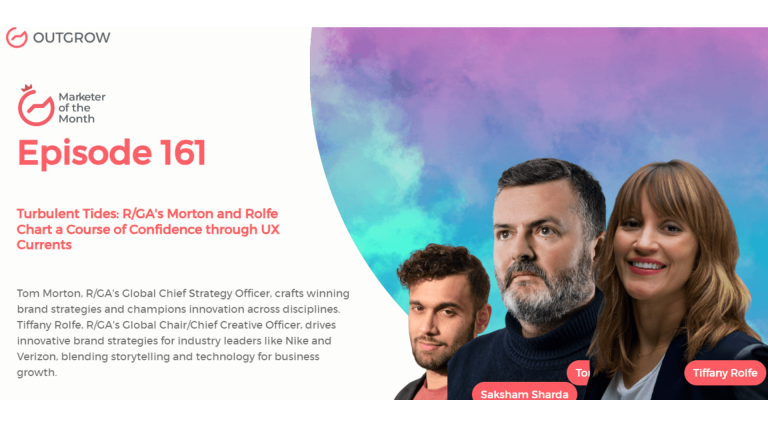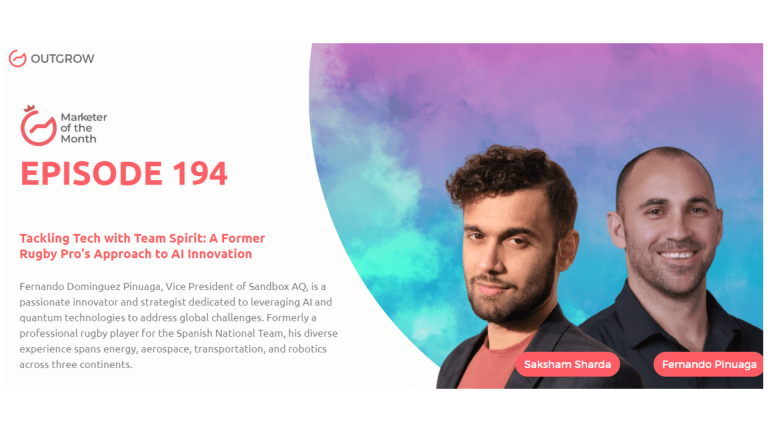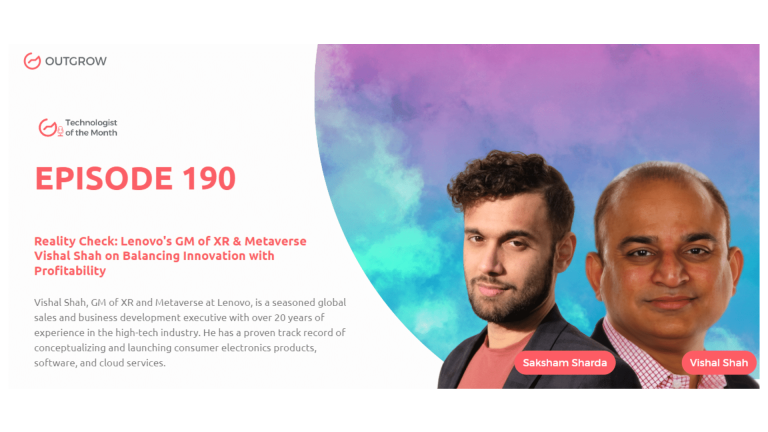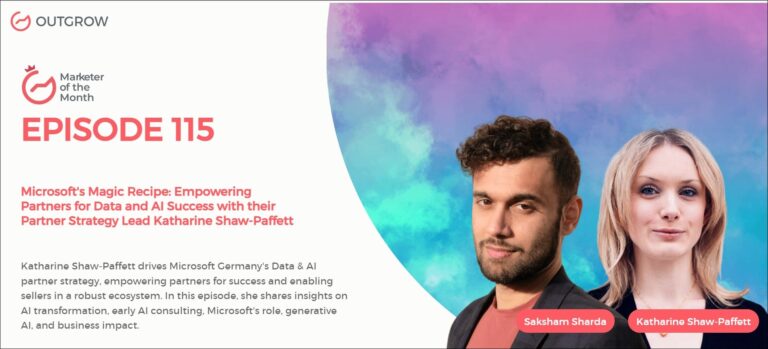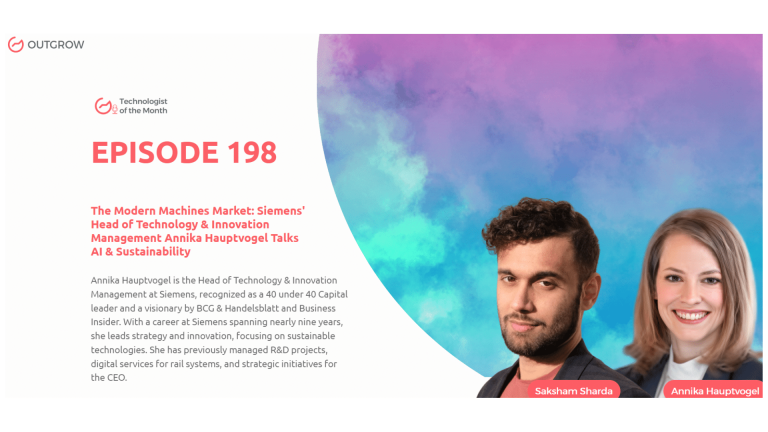Summarize with :
EPISODE 130: Marketer of the Month Podcast with Thomas Holl
Table of Contents
Hey there! Welcome to the Marketer Of The Month blog!
We recently interviewed Thomas Holl for our monthly podcast – ‘Marketer of the Month’! We had some amazing insightful conversations with Thomas and here’s what we discussed about-
1. Creativity and Problem-Solving Through Limitations.
2. Importance of Agile Project Management and Efficiency Through “Build, Measure, Learn” Cycle.
3. Driving Startup Growth with Performance Marketing.
4. The Role of Instinct in Entrepreneurship and The Founding Story of Babbel.
5. Babbel’s Evolution as a Language Learning Platform.
6. Balancing Innovation and Regulation in Technology.
About our host:
Dr. Saksham Sharda is the Chief Information Officer at Outgrow.co. He specializes in data collection, analysis, filtering, and transfer by means of widgets and applets. Interactive, cultural, and trending widgets designed by him have been featured on TrendHunter, Alibaba, ProductHunt, New York Marketing Association, FactoryBerlin, Digimarcon Silicon Valley, and at The European Affiliate Summit.
About our guest:
Thomas Holl is the President and co-founder of Babbel, an innovative language learning app. With extensive entrepreneurial experience spanning two decades, he drives Babbel’s North American expansion and product growth. Before Babbel, Thomas co-founded a music software startup, revolutionizing the industry with the world’s first MP3 DJ tool, later sold to Native Instruments and patented as Traktor.
Tower of Babel: Co-Founder of Babbel Thomas Holl on How to Create an Unstoppable EdTech Startup
The Intro!
Saksham Sharda: Hi, everyone. Welcome to another episode of Outgrow’s Marketer of the Month. I’m your host, Dr. Saksham Sharda, and I’m the creative director at Outgrow. co. And for this month we are going to interview Thomas Holl, who is the President and co-founder of Babbel.
Thomas Holl: Great to be here. Thank you.
Don’t have time to read? No problem, just watch the Podcast!
Or you can just listen to it on Spotify!
The Rapid Fire Round!
Saksham Sharda: Alright, so we’re gonna start with the rapid-fire round. There’s gonna be 15 questions, you can pass any of the questions you like but only one word or one sentence. Alright. So the first one, at what age do you want to retire?
Thomas Holl: At 90.
Saksham Sharda: How long does it take you to get ready in the morning?
Thomas Holl: I get up and I’m ready.
Saksham Sharda: Most embarrassing moment of your life?
Thomas Holl: Pass on that.
Saksham Sharda: Favorite color?
Thomas Holl: Blue.
Saksham Sharda: What time of day are you most inspired?
Thomas Holl: In the morning, at 5:00 AM
Saksham Sharda: How many hours of sleep can you survive on?
Thomas Holl: Seven.
Saksham Sharda: Fill in the blank. An upcoming technology or marketing trend is______.
Thomas Holl: Generative Music.
Saksham Sharda: The city in which the best kiss of your life happened?
Thomas Holl: Germany a small town called Lemberg.
Saksham Sharda: Pick one Mark Zuckerberg or Elon Musk?
Thomas Holl: Elon Musk.
Saksham Sharda: The biggest mistake of your career?
Thomas Holl: Not starting a company earlier.
Saksham Sharda: How do you relax?
Thomas Holl: I listen to music and I like to run.
Saksham Sharda: How many cups of coffee do you drink per day?
Thomas Holl: Three.
Saksham Sharda: A habit of yours that you hate?
Thomas Holl: Waking up in the morning and having to take a cold shower.
Saksham Sharda: The most valuable skill you’ve learned in life?
Thomas Holl: This is just to start.
Saksham Sharda: Your favorite Netflix, Amazon, or Apple TV show?
Thomas Holl: Breaking Bad was awesome.
Saksham Sharda: The last movie that you saw that was memorable?
Thomas Holl: Skip that. I’ve got Kids. Didn’t see any movies.
Saksham Sharda: The last song you listened to that was memorable?
Thomas Holl: From the Stars.
The Big Questions!
Saksham Sharda: Alright, well that’s the end of the rapid-fire round. You did amazing. We’ll go on to the bigger questions, but you can answer them with as much ease as you’d like. But before that, is there any one of the rapid-fire questions you want to answer in greater detail?
Thomas Holl: Good question. No, I think the kiss part will probably leave out here.
Saksham Sharda: Okay. So you built your first software at the age of 14. What made you particularly interested in building software at such a young age, and what was your thought process going along?
Thomas Holl: Speaking of kids, yeah, I was a kid back then and one of the challenges was like all of my friends had these excellent computers, etc, you could play games or do music or do any fun stuff. My dad, however, bought a PC so that was nothing really to do besides word processing, which like still today, I find pretty boring. So in a way that was fixing my own needs. I wanted to have like games, I wanted to have like my ability to do music and that was just not possible on PC because there was no software. So I think that was one of the principles that helped me in my life quite well, where I thought. Hey, how hard can that be? It’s like, I’m just going to write my software. And that’s what I just did. And I think that’s the part where starting in the music software, but then later on with this as well, I always found it super inspiring to see the need that I had or people around me had and then just used technology to fulfill that need or build tools and software to help people do stuff that they couldn’t do without. And that started at a very early age, and I still think that’s a very good principle because that led to the creation of Babbel as well.
Saksham Sharda: I feel like I had the same situation, but I spent all my time on my Microsoft Paint.
Thomas Holl: Not too shabby, either.
Saksham Sharda: But speaking of limitations leading you to be creative in this manner, are there any limitations today that are causing you to be creative and innovative in new spheres?
Thomas Holl: Yeah. I think most of the limitations can be quite helpful because with limitations I still think up today there are so many things that seem really like we’re living in the stone age of things like what I mean, we’re talking about AI a lot right now, but then it’s like super inspiring to see what ChatGPT can do and then you look at the phone and what it actually does and it’s still like pretty uninspiring. And I think that’s the reality, the edge in terms of figuring out for me like what’s coming next? What can I fix? How can I use these limitations or overcome those limitations with new tech and new products?
Saksham Sharda: So speaking of overcoming, according to you, why are HR methodologies critical in project management?
Thomas Holl: Super good question. And I think the biggest lever I usually have is not doing stupid things that shouldn’t be done in the first place. And because you can be very efficient with classical project management, but the risk, especially in a startup environment, is that you’re building the wrong thing. So from my perspective, what agile methodologies lead to or to get to a build measure learning cycle where you build something, you ship it out to users, you ship it out to your target customers, and you observe whether it solves their problem or it doesn’t. This rapidly is super important to build something that not just sounds great on paper, but that will be used. For me, the whole agile movement is enabling these build, measure, learn cycles because that’s what I found is the only thing that will prevent me or anyone else from building stuff for a very long time that will never be used. And I think that’s the ultimate waste of all of that. Because I’ve had so many examples in my career where you start with an idea that sounds amazing, you talk it through with friends, and it still sounds amazing. Then you go into like your room and as you build it for quite a long time, only in the end to find out, actually that’s not solving the issue in the way I thought it would be. And that’s where all HR methodologies I think can come in to say, let’s take just two weeks and after the two weeks we’ll ship it no matter how embarrassing it is. But from that, we’ll be able to learn and inspect and adapt and continue with that. So I think that is for me, like a bigger part of the philosophy of build, measure, learn and how HR methods fit into that cycle.
Saksham Sharda: Could you give us an interesting or engaging story about one of these stupidities or ideas going to miss?
Thomas Holl: There are so many. So where exactly should I start? Maybe, one element early in Babbel was that we started in 2008 with the first web app. And then we did technology and from a product perspective quite an instrument thing. So we did like speech recognition and in the browser on the device in 2000, I think that was so we had all that amazing tech technology back in there. So cross compilation between this technology and that technology, we spent quite a lot of time until we had the technology ready. And then we figured out that once we deployed it and once we put it into the hands of users, they were failing at the very first step. So like the whole chain of things that we’ve built, the first step was something where people struggled. So all of the effort that went into that we could have prevented by just saying what’s the first step? How would people use speech recognition? So I think that is a very drastic example of where not doing something like that or waiting for too long can hinder the company’s progress in the end.
Saksham Sharda: So let’s pivot to marketing a little. How can performance-based marketing help in the growth of one’s business? Do you think that performance-based marketing as a type of digital advertising is the need of the hour?
Thomas Holl: I think every startup especially needs some growth engine. And in the very end, if you boil it down, there are not that many growth engines available. So the whole digital advertisement is one of the growth engines you can go for PR, and virality as well. There are other forms as well, but I think it is a very important part because again, coming back to the build, measure, learning cycle, I think with digital advertising and performance marketing, you can find out the whole chain. Like I used to think of user acquisition, especially in digital channels as one step in fulfilling those needs. And you can iterate quite fast with digital marketing, with performance marketing as well to find your right target audience and figure out whether you like product market fit.
Saksham Sharda: So what role do you think in the answer to this, and to another previous question, what role do you think instinct has to play in the modern world? If we have growth-based marketing models and we have models for Agile, where do you think instinct comes in?
Thomas Holl: Yeah. I still think of most of the great products that have been made in the world, probably a big part came out of instinct. I think it came out of somebody scratching their own needs, having their ideas on what should be done. I think all of the technologies, growth engines, and models that we have, I think that is just a part of the mix. I think the whole being instinctive about things I wouldn’t like to start any company or any product where my instinct would tell me otherwise. I still think that is very helpful. And I think that’s what makes the difference between humans and machines.
Saksham Sharda: So speaking of instinct, leading to the founding of things, Babbel is a destination for language learners globally. What was the problem that you identified for language learning that led to the creation of Babbel and how did you identify it?
Thomas Holl: Yeah, that was a very funny moment. Because all of the four co-founders of Babbel, actually quit their jobs to start a music software tech company. So that was the moment we all left the jobs we started. And at that moment, one of my co-founders came and asked, “Hey, I wanna learn Spanish, is there, like, I couldn’t find anything online?” And that was about 2007 and we said like, let me Google that for you. And as Web 2.0 flickers, everything was online, at least from our perspective, but language learning wasn’t so we said like, okay, how hard can it be to build something like that to help people learn a language or to build a product that even my mom would be able to use. And that was the founding moment of Babbel. So we envisioned a world where you could use our tools, our software, and our platform with Babbel to learn a language and to do that online. And that was the founding moment. And I think what’s exciting to see is now after 15 years, we have developed into a platform for language learning experience. So we do not just have the self-study app that we started with, but we’re doing podcasts where we’re doing games and we have Babbel Live, which is our small group class led by experienced teachers which is super helpful because it helps you to learn and speak a language in the first place.
Saksham Sharda: So could you maybe relate the reason why you chose the name Babbel for the app to the mythical Tower of Babbel and the confusion it leads to? What role does technology have to play in this myth and where do you think you could relate this to?
Thomas Holl: Yeah. So when the first name of the company came out and liked the idea of Babbel there, honestly, I have to say I hated the name, that was my first instinct, but it grew on me over a couple of months because the Babbel is a way of it has connotations like you mentioned around the Tower of Babel. But I think it has to do something with multiculturalism nowadays. There are lots of dialects, at least in Germany where there is a connotation of two Babels’, which is kind of like casually talking and I think it captures pretty well what we want to do with the company and with the product. So not to build a product for Elite, but really to help millions of people learn and be able to speak a language in the first place. And I think Babbel is a very great name to express exactly that.
Saksham Sharda: And so what advice would you have for young minds who want to step into their entrepreneurial journey?
Thomas Holl: Yeah, I think one of the things for all of those who need to hear it is there is no magic silver bullet out there. Most of the time it’s going to suck. It’s going to be hard. But in the end, I think that can be the journey of your lifetime. And I think the most important thing is just to start. I think there are so many people out there who think they need that skill. They need like these other experiences, they need that type of work experience before they can start. And I think in many cases this is just your mind playing tricks with you. I think the most important thing is just to get started. Everything else will sort out itself.
Saksham Sharda: So besides your sector, if I were to reverse time and you had to start in another sector right now, what would be the other sector that you would encourage people to start in?
Thomas Holl: That is a very hard question that I don’t spend that much time thinking about. Because my brain is still a hundred percent focused on how to solve language learning and how to bring the Babbel to the next level. So I’d probably just start in language learning as well.
Saksham Sharda: And how do you feel with the entire focus of tech now moving to language and linguistics itself with generative AI and everything else?
Thomas Holl: Yeah, I think that is extremely exciting. So my background is in computer science. I studied neural networks and machine learning back in the 1990s-2000s. It’s great to see that many of those concepts work. They didn’t use the work back then very well. But I think one of the exciting things right now is really like imagining what you can do with these types of technologies. So what we wanna do at Babbel with that very much is how can we combine the human expertise that we have and use all those generative models to supercharge our teachers. And I think that combination of being able to scale the human experience by technology is exciting.
Saksham Sharda: So with technology being ingrained into our daily lives, do you think that there come with it some limitations or consequences?
Thomas Holl: Yeah, I mean, we all know these moments when AWS is down and you can’t access Netflix, you can’t access the whole internet. And I think that is one of those scary moments. And I think that will probably just accelerate in the future as well. And I think one of the discussions we need to have in society is where exactly to put up the guardrails and where to say things like, no, we need to be able to innovate. Let’s figure that out later. I think these are two extremes of the same thing. And that’s what we’re seeing around the world as well with generative AI for example is like, where do we put the regulation in there? Like at what point is it too late or at what point is it maybe too early for Europe? I think we usually are more on the side of being too cautious. So I would help, I would think and love it if at least regulation would come at a point when we understand much better what exactly we need to regulate and what the most critical points are. I still think the innovation potential of these new technologies is so great to deliver a lot of value for customers, for learners that I think we should just be able to believe in the future.
Saksham Sharda: Okay. So the last question for you is of a personal kind. What would you be doing in your life, if not this right now?
Thomas Holl: So maybe I’d be growing something on a farm. I think maybe planting some seeds and then taking care of the soil might be just something that I’d be interested in doing in another life.
Let’s Conclude!
Saksham Sharda: Thanks, everyone for joining us for this month’s episode of Outgrow’s Marketer of the Month. That was Thomas Holl, who is the President and co-founder of Babbel.
Thomas Holl: Pleasure. Thanks for having me.
Saksham Sharda: Check out the website for more details and we’ll see you once again next month with another marketer of the month.

Muskan is a Marketing Analyst at Outgrow. She is working on multiple areas of marketing. On her days off though, she loves exploring new cafes, drinking coffee, and catching up with friends.

